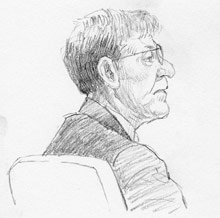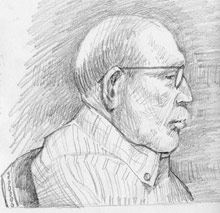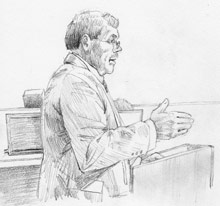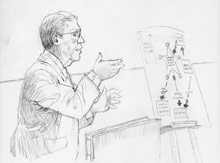For 12 years, Bobby Medford served as Buncombe County’s sheriff. Last week, he entered Asheville’s federal courthouse on the other side—as a defendant in one of the biggest public-corruption cases in Western North Carolina history.

Medford is on trial along with former reserve Capt. Guy Penland. The trial is the culmination of about two years of government investigation into Medford’s connection to the illegal operation of video-gaming machines. It promises to unveil the elaborate connections—in terms of both money and favors exchanged—among Medford, some of his former top lieutenants, and video-poker-machine owners and operators.

Led by Assistant U.S. Attorney Richard Edwards, the prosecutors, unfolded their case during the trial’s opening week. Mountain Xpress was there, and we offer this comprehensive, day-by-day summary.
Day 1: Tuesday, April 29
The long-awaited trial began as Judge Thomas Ellis III summed up the charges and laid out guidelines for the case.

Thanking the 69 potential jurors, who were drawn from the 16 counties of North Carolina’s Western District, Ellis gave what he called a “thumbnail sketch” of the 10 charges against Medford and Penland: extortion under color of law, obstruction of justice, conspiracy to commit mail fraud, running an illegal-gambling operation, money laundering and five specific counts of mail fraud. The judge then sent them off to fill out a questionnaire intended to determine whether any of them were ineligible to serve as jurors in the trial.
About 20 spectators, many of them members of the media, attended the proceedings. Both Medford and Penland were asked to stand when identified. Wearing a brown leather jacket, Medford stood slightly stooped and, turning to face the crowd of potential jurors, offered a half-nod before sitting down.
“Remember, an indictment is not proof in any way—it’s just a formal way of presenting a charge,” said Ellis, noting that since both men had pleaded not guilty of extracting money from illegal video-poker-machine operators, they should be presumed innocent until the jury ruled otherwise.
Jurors in the case were identified only by numbers. “That’s to protect your privacy, and so no one starts calling you or anything like that,” the judge explained.
After the jury had filed out, Ellis laid down some basic rules for the trial. In the much larger metropolitan area where he usually presides, the judge noted, all subpoenaed witnesses are typically called into the courtroom at once and told that they may be called to testify. But he agreed to let Edwards and defense attorney Stephen Lindsay abide by the Western District’s usual practice, in which witnesses are simply notified by mail or phone. The extensive witness list for the trial includes current Sheriff Van Duncan, District Attorney Ron Moore and Board of Elections Director Trena Parker.
Ellis also agreed to follow the district’s usual practice of letting the attorneys keep the exhibits for their respective sides. In addition, the judge dismissed three potential jurors—two because they had terminally ill relatives and another who’d recently suffered a severe head injury.
But Ellis did note that he will change one customary practice of the court: In their opening remarks, attorneys will address the jury from a lectern, instead of moving around and addressing the jury directly “in the eye,” as he termed it.
“In my experience, jurors don’t really like that,” said the judge.
After the potential jurors had filled out questionnaires, Ellis immediately excused 10 more, based on their answers. Medford could be seen poring over the questionnaires with his defense attorneys, while Penland leaned back in his chair for most of the afternoon. When both prosecutors and defense attorneys asked for more time, Ellis responded, “I had to go through these quickly, but I have … no more resources than you” before granting them a 10-minute break to continue reviewing the potential jurors’ answers.
After that, Ellis peppered potential jurors with rapid-fire questions about their backgrounds, opinions on the case, beliefs about gambling and previous experiences with law enforcement. One man was excused because he said that after seeing footage of Medford in shackles on television, “I figured he must be guilty of something.”

The jurors are being drawn from all over the federal Western District of North Carolina. One woman told Ellis that she’d had to travel 115 miles from Cleveland County to participate.
By day’s end, about half the potential jurors had either been dismissed or questioned. But in what he later called “a fit of unfounded optimism,” Ellis revealed that he’d originally hoped to get as far as the attorneys’ opening statements on the first day.
Day 2: Wednesday, April 30
Jury selection continued throughout the morning. Some potential jurors were excused because they worked for Buncombe County, were ill, knew witnesses in the case, would face financial hardship if they had to serve on the jury and, in one case, because they said they had a deep distrust of lawyers in general.
After the lunch break and much wrangling between prosecution and defense attorneys, a 10-man, two-woman jury was finally seated, and both sides proceeded with their opening statements, painting decidedly different pictures of the former law-enforcement officers.
“The evidence will show that [Medford] and others extorted, using their office for their own gain, and defrauded the citizens of Buncombe of the fair dealings they deserved,” asserted Edwards.
Lindsay, on the other hand, depicted Medford as a good cop “who trusted the wrong people.”
Aided by several charts detailing a conspiracy in which Medford and several of his deputies (including Penland) allegedly gave illegal video-poker-machine operators favors in exchange for money, Edwards presented an overview of his forthcoming case, saying he will unveil the details of the crimes via witnesses (including three of Medford’s former deputies who accepted plea bargains), bank statements, financial records and more. “Medford ran a criminal conspiracy for gain, for himself and others close to him—and you’ll hear from some of them, including [former Lts.] Johnny Harrison and Butch Davis,” Edwards told the jury. Originally charged with Medford, both men later accepted plea deals.
A state law passed in 2000 limited the number of video-poker machines in North Carolina to those already in operation, making it “a very lucrative business here,” said Edwards. After that, he noted, most of those attending the biannual golf tournaments Medford held—ostensibly as fund-raisers for his campaign—were video-poker-machine operators. The prosecutor also said that although there were only 365 machines in Buncombe County in 2000, the sheriff’s office subsequently requested 1,350 registration stickers.

“Clearly, something was going on here,” said Edwards, adding that video-poker operators were routinely given special deputy’s badges—in one case, on the same day the person in question had written a $1,000 check to Medford’s re-election campaign. Those were only some of the many favors Medford and some of his deputies did for the video-poker operators, said the prosecutor.
Wearing a dark suit, Medford silently observed Edwards’ presentation, his hand on his chin.
In contrast, defense attorney Lindsay’s opening remarks sought to portray Medford as a talented, hard-working investigator who, given no state funding to regulate the video-poker machines, had little to do with overseeing them, preferrring to delegate that responsibility.
“He turned it over to someone he trusted—Johnny Harrison—and went back to matters he had to give a higher priority,” said Lindsay. Medford “was a respected detective, but he had his failings as an administrator—he trusted too much.
“If you’re looking for criminal activity here, you won’t find it in Bobby Medford. He was always a sheriff for, by and of the people,” his attorney added.
The video-poker law—which also banned cash payouts to winners and called for the gradual phasing out of all machines—was doomed from the start, argued Lindsay, painting an almost-rosy picture of the role the machines played.
“Mom-and-pop shops couldn’t keep things running selling just peanut butter: They needed the cash provided by video-poker machines. It allowed small restaurants to put good meat on the table,” said the attorney. “They could grow their business—the great American dream.”
Nonetheless, he said, Medford had warned video-poker operators at a public meeting in 2000 that they “better not have any fights at their establishments” and had tried to discourage turf wars. Earlier, Edwards had said that Medford sought such stability as part of the favors he gave the machine operators.
But Lindsay drew a stern rebuke from Judge Ellis when he tried to cast doubt on the government’s witnesses. “They can go, ‘Say what we want you to say and we’ll let your children go,’” asserted Lindsay, talking about what prosecutors can offer witnesses who cooperate.
Ellis, however, cut the defense attorney off, asking, “Do you have proof of that?” Lindsay said he did. But later, after the jurors had cleared out, Ellis took Lindsay to task, saying, “If you meant to imply the government was suborning perjury, that’s a very, very serious charge.”
Lindsay said he didn’t, but another federal prosecutor in the case, Corey Ellis (no relation to Judge Ellis), said he felt the words had implied that.
The judge seemed to agree, observing, “If someone had said that to me when I was a prosecutor, I’d have been up on the ceiling.” Lindsay then apologized to the prosecutors, Judge Ellis and the court, explaining that he was only trying to convey the circumstances faced by those who’d accepted plea deals.
“I came at it from the wrong end, your honor. I apologize,” said Lindsay.
During Lindsay’s opening statement, Medford appeared visibly upset. He drew tissues from a box on the table in front of him and repeatedly dabbed his eyes and nose. At one point Victoria Jayne, Medford’s second defense attorney, reached over and patted him on the shoulder.
Meanwhile, Penland’s attorney, Paul Bidwell, described his client as someone who’d dreamed of being a deputy and had worked hard to achieve that. (Lindsay had told a similar story earlier, noting that although a DWI conviction had previously ended Penland’s career, he’d continued to help the sheriff’s office as a volunteer.) In that capacity, continued Bidwell, Penland was put to work on video-poker registration, because the state did not provide extra funding for it.
In the course of those efforts, said Bidwell, Penland introduced Jerry Pennington—a “heck of a salesman” for (video-poker-machine operators) Henderson Amusements—to people he knew around the county. (Pennington has since accepted a plea deal.)
Bidwell did note that at Pennington’s request, Penland had agreed to run an undercover FBI agent’s license-plate number through the state’s database and had confirmed that it probably belonged to an undercover agent. But the attorney said it was an innocent mistake that Penland now regrets.
“If he could go back in a time machine,” Bidwell began, but the judge cut him off, cautioning that he was not supposed to argue his case in his opening statement, merely frame his evidence. Bidwell replied that his evidence would vindicate Penland.
“There was nothing illegal in [Penland’s actions]—he was duped,” said Bidwell, adding, “Anything that Bobby Medford may or may not have done, Guy Penland is not a criminal.”
Day 3: Thursday, May 1
Whether it was through organized golf tournaments or in hand-delivered envelopes, a former Buncombe County sheriff’s deputy testified Thursday that cash flowed from video-poker-machine operators to former Sheriff Bobby Medford. Johnny Harrison detailed the cash flow generated by golf tournaments he organized as fund-raisers for the sheriff’s office. Harrison oversaw the tournaments, saying that after 2000, the events focused on team sponsorships from video-poker-machine owners. The tournaments featured 32 or 33 four-man teams, each paying $300—or, in later years, $400—to participate. More money was generated by asking people to sponsor individual holes and to buy mulligans, said Harrison.
In election years, the money Harrison and fellow deputies collected went to Medford campaign officials, who reported it to the Buncombe County Board of Elections, he said. In nonelection years, Harrison said the money went to the trunk of his county-issued car, where he kept it until Medford said he needed cash. “There was nowhere to put it; we had no bank account,” said Harrison. When Medford did need cash, Harrison said he, Guy Penland or another deputy would sign Medford’s name and then cash the checks at either George’s Mini-Mart on Leicester Highway or two Bi-Lo stores.
Harrison also testified that he would ask video-poker-machine owners for cash on Medford’s behalf, saying, “I would just tell them the sheriff needed a favor,” and would then set up a meeting to collect the cash and pass it to Medford directly or deliver it to his office. Harrison, who rose to the rank of lieutenant over the course of about 11 years in the department, told the court that he’d pleaded guilty to a charge relating to the illegal-gambling operation and, as part of the plea deal, had agreed to testify for the government.
In other testimony Thursday:
• Eddie Caldwell, executive vice president and general counsel for the nonprofit N.C. Sheriff’s Association explained the details of the change in the state’s video-poker-machine laws in 2000 and the association’s dealings with the Buncombe County sheriff’s office in regard to that change. The association’s key interaction with sheriff’s departments across the state involved the creation and issuance of orange registration stickers that had to be placed on all video-gaming machines in North Carolina.
According to Caldwell, Buncombe County reported a total of 365 machines in the county as of Oct. 1, 2000. Over the next six years, he said, the association sent a total of 1,350 registration stickers to the Buncombe County sheriff’s office at the request members of the department, including reserve Capt. Penland and Lts. Harrison and Davis. On cross-examination, Caldwell said the association did not try to verify the accuracy of the initial machine count in 2000, nor did it know how many of the stickers were actually used on machines.
• FBI agent Andrew Grafton told the court that he helped carry out a search warrant on Feb. 22, 2007, at the home of former Lt. Davis. Grafton said he was part of a search team that found $18,000 in cash wrapped in tinfoil and stuffed in basement ceiling rafters. Other items found in the search included: a Rolodex with the names and business cards of video-poker-machine operators; a Cadillac; three sets of golf clubs; a video-poker machine; notes regarding golf tournaments; an employee statement of Davis’ earnings; and a receipt for a $25,000 deposit at Mountain First Bank & Trust in 2000.
Day 4: Friday, May 2
Showing his 67 years of age, Harrison stooped to reach the witness stand’s microphone as defense attorney Jayne questioned his motivation in signing the plea agreement.
“All charges but one [extortion under color of law] were dropped, and you’ve got a beach home in North Myrtle Beach. Do you still hope to avoid prison—and retire there?”
But Harrison replied bluntly, “Ma’am, when I plead guilty, that’s because I am guilty.”
He added that “it would be great” to avoid any prison time, but said he didn’t necessarily expect that from the government.
“It’s difficult for me to be up here talking about Bobby, talking about Guy. But what’s done is done. I did what I did, and I realized there wasn’t a point in fighting that,” said Harrison.
After he left the witness stand, prosecutors called Nick Anagnostopoulos, the former owner of George’s Mini-Mart where Medford’s deputies would go to cash checks from his golf tournaments, prosecutors allege. Anagnostopoulos also testified that he had two video-poker machines in his store making illegal cash payouts, that the machines were owned by confessed illegal-gambling-ring operator Demetre “Jimmy the Greek” Theodossis, and that he and Theodossis had met with Medford in his office in 2000 to discuss the new video-poker law.
“He said he wanted us to run a clean establishment—he wouldn’t cause problems for us if we didn’t cause problems for him,” Anagnostopoulos said. “He also said he wanted the money staying in Buncombe County instead of going to Cherokee.”
Ironically, Medford recorded $54,000 in gambling losses at Harrah’s Cherokee Casino in 2005, though defense attorneys have asserted that he spent only legitimate money there.
Anagnostopoulos said Medford never entered the store to cash checks personally. Instead, he would wait outside in a car while an unidentified woman brought the checks inside. Prosecutors produced seven pages of bank records detailing checks from Medford’s golf tournaments that had been cashed at the store.
Later Friday afternoon, the prosecution called Jack “Jackie” Willis Shepherd to the stand. The Weaverville businessman testified that he’d supported Medford’s initial campaign for sheriff in 1994 by spending between $20,000 and $30,000 on everything from printed campaign materials and barbecue fund-raisers to a tailor and a public-speaking coach.
Shepherd said he supported Medford because he thought the candidate would “clean up the county” and because he’d gotten word in 1993 that then Sheriff Charlie Long was watching Shepherd’s video-poker-machine business.
Shepherd, who owned a pawnshop, small strip shopping centers and a string of convenience stores, said his son, Jackie Dewayne Shepherd oversaw the operation of video-poker machines in his stores. The elder Shepherd said he took over the machines in 1998 or ‘99 because his son “got involved in drugs and wasn’t running his business, and he had stole some money from me.”
Shepherd told the court that he created a company called Western Amusement in 2001 in reaction to the change in state law in 2000 that required video-poker machines to be registered and then slowly phased out. Shepherd said “it was known countywide” that he paid out winnings on his machines to players he and his store clerks knew.
“If we knew the person playing and they brought us a ticket for $500 or $1,000, we would pay them,” he said.
Over the years, said Shepherd, he loaned Medford money and cashed checks for him because he thought Medford needed the money and because the sheriff’s office wasn’t “bothering the poker machines.”
During the three years leading up to the 2006 election, Shepherd said he once delivered $1,000 to Medford’s office. Another time, former Deputy Randy Bradford picked up cash from Shepherd for Medford. Another time, Johnny Harrison asked for $2,000, and Shepherd said he gave it to him.
Shepherd also testified that on Nov. 14, 2006, he received a call from “Butch” Davis warning him to “be careful,” because federal agents were raiding Theodossis’ home and business.
Under questioning by Corey Ellis, Shepherd told the court he had already pleaded guilty to a charge of operating an illegal gambling business and was facing one to five years in prison, a $250,000 fine and forfeiting about $680,000. Shepherd said he hadn’t been sentenced yet.
In other prosecution testimony Friday:
• Former county dispatcher Robert James “Jim” Robinson testified that memos issued after the May 16, 2005 license plate check he conducted for Penland instructed dispatchers not to run information through the databases for Penland.
• Linda Clontz, a court official who oversaw Buncombe County’s program for people sentenced to perform community service, said she called Medford sometime after Aug. 18, 2003, to express “my displeasure and doubts” about the fact that Henderson Amusement employee Jerry Pennington had completed his community service at the Sheriff’s Department. Pennington had been arrested in Cleveland County, but a judge’s order there transferred his community service to Buncombe County, a “very unusual” move, according to Clontz. Clontz received a time sheet signed by Lt. Harrison stating that Pennington had done his time, but Clontz said she thought the time sheet had been falsified. “It was intuition; a gut feeling.”
• Anna P. Deaton testified that she worked for Henderson Amusement as a record keeper. She told the court that she transcribed Pennington’s notes regarding payments, including payments to Guy Penland and the Buncombe County Sheriff’s Department. The records showed that payments were made for “Christmas money,” for locating machines in stores, for gas and for the golf tournaments.
• Also Friday, Judge Ellis dismissed a juror who told that court that he was friends with Wayne Garren, a video-poker-machine owner whose name had come up in opening statements and in documents presented as evidence. Ellis said the friendship “presents a conflict that’s simply too plain.” One of two alternates will sit in the excused juror’s place.



Before you comment
The comments section is here to provide a platform for civil dialogue on the issues we face together as a local community. Xpress is committed to offering this platform for all voices, but when the tone of the discussion gets nasty or strays off topic, we believe many people choose not to participate. Xpress editors are determined to moderate comments to ensure a constructive interchange is maintained. All comments judged not to be in keeping with the spirit of civil discourse will be removed and repeat violators will be banned. See here for our terms of service. Thank you for being part of this effort to promote respectful discussion.